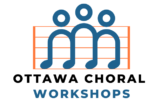ABOUT
OUR MISSION
We’ve come to believe that most people – from novice to highly experienced singers – are capable of much more than they know, and that with support can enjoy rich and ever more fulfilling lives as ensemble musicians. Regardless of a singer’s level, our workshops are about unlocking that potential.
ABOUT ROLAND
Hailed “an excellent conductor and inspiring educator” Roland Graham possesses an innate gift for teaching, which, combined with natural ease at the podium, he has leveraged time and again to draw miraculous results from the singers he leads. Building on a musical formation begun with piano lessons and choral singing as a child, he channels the mentoring he received from amazing teachers into an instruction model that is original and refreshing, motivated at its core by the conviction that amateur singers are capable of far more than they know.
By framing music-making as an organic process comprised of simple foundational elements that anyone can access and master, he has enabled countless individuals to experience music making as they never imagined they would, in both the learning stages, and in performances that offer equal joy to participants and to the community at large. Learn More.



ABOUT THE WORKSHOPS
Originating as a training program for novice choral singers in the summer of 2015, Roland’s Ottawa Choral Workshops has evolved into a movement that offers a unique approach to learning and experiencing choral music. Based on the idea that anyone, regardless of their skill level, can enjoy profound and transformative musical experiences, Roland has developed introductory, intermediate and advanced choral singing courses that break down barriers and support participants in accessing their musical potential.
Viewing music in terms of a holistic process in which anyone can immerse themselves, Roland’s workshops guide singers from an initial meeting through a few weeks of rehearsal to a concluding performance that marks and celebrates their accomplishments before the community. In the process, they explore profound music, make new friends, increase confidence and personal agency, and ultimately learn the power and vitality of their own voice.

THE APPROACH
Committed to efficiency and the best time management, workshops alternate ‘sectional rehearsals’ where small groups of similar voices receive focused instruction on topics specific to their voice and part with ‘tutti rehearsals’ where the complete ensemble sings together in four-part (or more-part, as the case may be) harmony.
Each session begins with a vocal warmup geared to orient singers to using the instrument that is their body. A musical or technical concept relevant to the stage of the process and the musical repertoire is then introduced, and explored/applied as the session unfolds. Introductory workshops prioritize fundamentals such as how to count and feel rhythm, follow musical scores, and the basics of singing in harmony. Intermediate and advanced courses assume singers have mastered some of that, but offer helpful tips and strategies that reinforce the skillsets.
Popular subjects explored in all workshops include the anatomy of musical phrases and hierarchy of emphases, how to navigate consonant clusters and stagger breathe, the relationship between the beat and other elements of the music, and techniques for efficient personal/home study. The biggest differences between introductory, intermediate and advanced workshops are the complexity of the repertoire programmed and the pace of rehearsing.
Each workshop takes a measure of its own direction, as influenced by the unique needs and abilities of participants, who are always encouraged to bring questions and areas of personal interest to the group. We often learn the most interesting and unexpected things through the discussions that arise!





WHO ARE CHORAL WORKSHOPS FOR?
Really these workshops are for anyone; if you’re reading this page there’s a good chance they’ll be for you! That said, here are a sample of motivations that have brought people to them in the past:
- You’d love to sing in a choir but have little or no experience and aren’t sure where to start.
- You sang in a choir years ago and worry your voice and skills are too “rusty” to start up again.
- You are apprehensive about auditioning for a choir.
- You sing well next to a strong singer but want more confidence of your own.
- You’ve been encouraged by your choir director to get some instruction to advance your abilities but aren’t keen on private voice lessons.
- You sing by ear but don’t know how to read or count and want to work on that.
- You play another instrument or know the basics of music another way and would love to apply that to singing.
- You find it takes you longer than you would like to learn new music and/or you don’t know how to practise efficiently on your own.
- You are confident in your singing and find music really interesting and would love to deepen your understanding of how it works.
- You are an amateur choral director yourself (maybe you lead a company Christmas choir) and would benefit from some ideas on how to lead others in song.
- You are attracted to a stimulating new challenge, perhaps with a new group of people or a different style or size of choir from other recent choral experiences.
- You don’t want to join a choir permanently or can’t because of work/travel and like the idea of a short-term commitment.
- Singing a particular masterpiece or with an orchestra is on your bucket list
Upcoming WORKSHOPS

FALL 2024
WORKSHOPS
Sing Fauré’s Requiem with orchestra in a ‘paradise’-themed concert November 2024

NICARAGUA WORKSHOP
Join the second annual NICW, an international singing experience like no other, happening February 2025

SPRING 2024 WORKSHOP
Details forthcoming; to feature a large-scale choral masterpiece in concert June 2025
